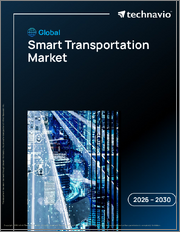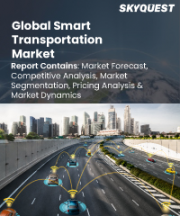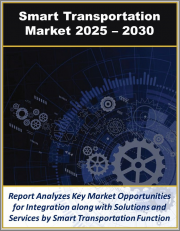
|
시장보고서
상품코드
1846008
스마트 교통 시장 : 솔루션, 용도, 서비스, 지역별(2024-2031년)Smart Transportation Market By Solution, Application, Service & Region for 2024-2031 |
||||||
스마트 교통 시장 평가 - 2024-2031
급속한 기술 발전, 도시화의 진전, 지속가능성에 대한 관심 증대가 스마트 교통 시장을 주도하고 있습니다. 인공 지능(AI), 사물 인터넷(IoT), 데이터 분석의 혁신은 실시간 교통 관리, 자율 주행 차량, 통합 교통 시스템을 가능하게 하여 2024년에는 1,379억 4,000만 달러를 넘어 2031년에는 3,029억 5,000만 달러에 달할 것입니다.
또한, 스마트 교통은 자율주행차와 스마트 교통 신호등부터 실시간 대중교통 업데이트와 첨단 주차 관리 시스템까지 다양하고 영향력 있는 분야입니다. 이러한 기술들은 실시간 데이터 제공, 경로 계획 최적화, 차량과 인프라의 연결성 향상을 통해 교통망의 효율성과 안전성을 높이기 위해 협력하고 있으며, 2024년부터 2031년까지 약 11.40%의 CAGR로 시장 성장이 예상됩니다.
스마트 교통 시장 정의/개요
스마트 교통은 IoT, AI, 데이터 분석 등 첨단 기술을 교통 시스템에 통합하여 효율성, 안전성, 지속가능성을 향상시키는 것을 말합니다. 실시간 교통관리, 자율주행차, 이동을 최적화하고 교통체증을 완화하는 스마트 대중교통 솔루션 등이 그 적용 사례입니다. 앞으로 스마트 교통의 미래는 이러한 기술을 확장하고 완전히 통합된 모빌리티 네트워크를 구축하여 도시 교통의 효율성을 높이고, 환경 부하를 줄이며, 빠르게 발전하는 도시의 전반적인 삶의 질을 향상시키는 것을 의미합니다.
급속한 도시화가 스마트 교통 시장을 견인할 것인가?
급속한 도시화는 스마트 교통 시장의 성장을 촉진하는 큰 요인입니다. 도시의 규모와 인구가 증가함에 따라 교통체증, 공해, 인프라의 왜곡이 증가합니다. 정교한 교통 관리 시스템, 자율주행차, 통합 대중교통 네트워크와 같은 스마트 모빌리티 기술은 이러한 문제를 해결하는 데 필수적입니다. 스마트 기술은 이동성을 높이고, 교통 체증을 완화하고, 교통 시스템의 효율성을 개선함으로써 도시가 증가하는 교통 수요를 관리하고 보다 지속가능한 도시 환경을 구축할 수 있도록 돕습니다.
최근 정부와 업계의 발표는 스마트 교통 시장에 대한 투자 증가를 보여주고 있습니다. 예를 들어, 2024년 8월 미국 교통부는 스마트 시티 프로젝트와 첨단 교통 기술을 지원하는 5억 달러의 자금 지원 캠페인을 발표했습니다. 또한, 2024년 7월 포드자동차는 새로운 스마트 차량 기술 탐구와 전기자동차 및 자율주행차 라인업 확대를 위해 10억 달러를 투자하겠다고 밝혔습니다. 이러한 투자는 스마트 교통 솔루션의 중요성이 커지고 있으며, 급속한 도시화 문제를 해결하는 데 있어 이 분야가 중요한 역할을 하고 있음을 보여줍니다.
사이버 보안 리스크가 스마트 교통 시장의 성장을 저해할까?
교통 시스템의 상호연결성이 증가함에 따라 사이버 공격에 취약해지고 있습니다. 자율주행차, 네트워크화된 인프라, 스마트 교통 관제 시스템과 같은 첨단 기술의 도입은 주요 시스템을 해커나 악의적인 행위자의 잠재적 공격에 노출시킬 수 있습니다. 사이버 공격은 차량의 안전을 위협하고, 교통 흐름을 방해하고, 데이터 프라이버시를 위험에 빠뜨리고, 사회적 신뢰를 훼손하고, 스마트 교통 기술의 채택을 방해할 수 있습니다.
이러한 우려에도 불구하고, 업계 이해관계자들이 잠재적인 공격을 줄이기 위해 강력한 사이버 보안 조치를 도입하고 있기 때문에 스마트 교통 비즈니스는 확대되고 있습니다. 강화된 암호화, 실시간 위협 감지, 안전한 통신 프로토콜에 대한 투자는 운송 네트워크를 보호하고 사이버 공격에 대한 저항력을 갖추는 데 필수적입니다. 이 부문이 이러한 문제에 대응하고 보안 표준을 개선하면 사이버 보안 위협의 영향을 줄일 수 있으며, 스마트 교통 기술의 성장과 확장을 촉진할 수 있습니다.
목차
제1장 소개
- 시장 정의
- 시장 세분화
- 조사 방법
제2장 주요 요약
- 주요 조사 결과
- 시장 개요
- 시장 하이라이트
제3장 시장 개요
- 시장 규모와 성장의 가능성
- 시장 동향
- 시장 성장 촉진요인
- 시장 성장 억제요인
- 시장 기회
- Porter's Five Forces 분석
제4장 스마트 교통 시장 : 솔루션별
- 교통 관리 시스템(TMS)
- 주차장 관리 시스템
- 대중교통 시스템(PTS)
- ADAS(첨단 운전자 보조 시스템)
- 커넥티드·차량(CV)
- 화물 관리 시스템
제5장 스마트 교통 시장 : 용도별
- 도로
- 철도
- 항공
- 해운
제6장 스마트 교통 시장 : 서비스별
- 클라우드 서비스
- 비즈니스 서비스
- 전문 서비스
제7장 지역별 분석
- 북미
- 미국
- 캐나다
- 멕시코
- 유럽
- 영국
- 독일
- 프랑스
- 이탈리아
- 아시아태평양
- 중국
- 일본
- 인도
- 호주
- 라틴아메리카
- 브라질
- 아르헨티나
- 칠레
- 중동 및 아프리카
- 남아프리카공화국
- 사우디아라비아
- 아랍에미리트
제8장 시장 역학
- 시장 성장 촉진요인
- 시장 성장 억제요인
- 시장 기회
- COVID-19의 시장에 대한 영향
제9장 경쟁 구도
- 주요 기업
- 시장 점유율 분석
제10장 기업 개요
- IBM
- Microsoft
- Cisco Systems
- Huawei Technologies
- Ericsson
- Tesla
- Toyota Motor Corporation
- Daimler AG
- Siemens AG
- Schneider Electric SE
- Honeywell International Inc.
제11장 시장 전망과 기회
- 신기술
- 향후 시장 동향
- 투자 기회
제12장 부록
- 약어 리스트
- 정보 출처와 참고문헌
Smart Transportation Market Valuation - 2024-2031
The increasingly rapid technological advancements, growing urbanization, and a heightened focus on sustainability is driving the smart transportation market. Innovations in artificial intelligence (AI), the Internet of Things (IoT), and data analytics enable real-time traffic management, autonomous vehicles, and integrated transportation systems is surpassing USD 137.94 Billion in 2024 and reaching USD 302.95 Billion by 2031.
Furthermore, smart transportation are diverse and impactful, ranging from autonomous vehicles and smart traffic signals to real-time public transit updates and advanced parking management systems. These technologies work together to enhance the efficiency and safety of transportation networks by providing real-time data, optimizing route planning, and improving vehicle and infrastructure connectivity, market growth is expected to grow at a CAGR of about 11.40% from 2024 to 2031.
Smart Transportation Market: Definition/ Overview
Smart transportation is the integration of sophisticated technologies such as IoT, AI, and data analytics into transportation systems to improve efficiency, safety, and sustainability. Real-time traffic management, self-driving cars, and smart public transportation solutions that optimize travel and alleviate congestion are among the applications. Looking ahead, the future of smart transportation entails expanding these technologies to establish fully integrated mobility networks, allowing for more efficient urban transit, lowering environmental impact, and increasing general quality of life in quickly rising cities.
Will Rapid Urbanization Drive the Smart Transportation Market?
Rapid urbanization is a major factor driving the growth of the smart transportation market. As cities grow in size and population, they suffer increased traffic congestion, pollution, and infrastructure strain. Smart mobility technologies, such as sophisticated traffic management systems, self-driving vehicles, and integrated public transit networks, are critical for tackling these concerns. Smart technologies assist cities in managing their growing transportation needs and creating more sustainable urban settings by boosting mobility, decreasing congestion, and increasing transportation system efficiency.
Recent government and industry announcements show increasing investment in the smart transportation market. For instance, in August 2024, the USDOT announced a $500 million funding campaign to assist smart city projects and sophisticated transportation technologies. Furthermore, in July 2024, Ford Motor Company pledged $1 billion to explore new smart vehicle technology and extend its electric and autonomous vehicle lineup. These investments demonstrate the growing importance of smart transportation solutions and the sector's critical role in solving the difficulties of rapid urbanization.
Will Cybersecurity Risks Hinder the Growth of the Smart Transportation Market?
Increasing cybersecurity issues constitute a serious threat to the expansion of the smart transportation business, since transportation systems' increased interconnectedness leaves them vulnerable to cyber-attack. The incorporation of advanced technology such as self-driving cars, networked infrastructure, and smart traffic control systems exposes key systems to potential attacks from hackers and malevolent actors. Cyberattacks might jeopardize vehicle safety, interrupt traffic flow, and jeopardize data privacy, eroding public trust and impeding the adoption of smart transportation technologies.
Despite these concerns, the smart transportation business is expanding as industry stakeholders install strong cybersecurity measures to reduce potential attacks. Investments in enhanced encryption, real-time threat detection, and secure communication protocols are critical for protecting transportation networks and making them resilient to cyber-attacks. As the sector adjusts to these problems and improves its security standards, the impact of cybersecurity threats can be mitigated, allowing smart transportation technology to grow and expand further.
Category-Wise Acumens
How will Usage of Parking Management Systems Fuel the growth of Smart Transportation Market?
The implementation of parking management systems is expected to drive significant growth in the smart transportation market by addressing critical urban mobility issues. These systems combine IoT sensors, real-time data analytics, and mobile apps to maximize parking space utilization, minimize congestion, and improve the parking experience. These technologies reduce traffic and stress by giving drivers with real-time information about available parking spaces and offering smooth payment alternatives. This efficiency improves overall transportation fluidity and complements larger smart city initiatives, resulting in a more coherent and successful urban mobility environment.
Furthermore, the implementation of modern parking management solutions helps to boost the smart transportation market by stimulating the development of related technologies and infrastructure. For example, integrating parking data with traffic management systems can result in wiser city planning and better traffic flow. The increased efficiency and convenience afforded by these systems make them appealing to both municipalities and commercial enterprises, resulting in increased investment and innovation in smart transportation.
However, public transportation systems are emerging as the fastest-growing section of the smart transportation market. Smart ticketing, real-time tracking, and self-driving buses are changing public transportation by increasing efficiency, accessibility, and use. As cities throughout the world work to alleviate congestion and promote sustainability, the adoption of innovative public transportation systems grows, highlighting the sector's critical position in the future of smart mobility. This rapid expansion demonstrates the growing emphasis on incorporating intelligent solutions into public transportation to fulfill the needs of modern urban environments.
How will Airways propel the Smart Transportation Market?
The airline sector is poised to rapidly accelerate the smart transportation market by incorporating modern technology to improve operational efficiency and passenger experience. AI-powered air traffic control systems, self-driving planes, and real-time data analytics are all changing the way we fly. These technologies increase safety, minimize delays, and optimize flight routes, causing a ripple effect that propels progress in adjacent smart transportation sectors. As airlines and airports implement these smart technologies, they establish new benchmarks for efficiency and connectivity, resulting in more investment and development in complementary transportation solutions.
Furthermore, the emphasis on developing more sustainable aviation techniques, such as electric and hybrid aircraft, is consistent with the larger trend toward smart and environmentally friendly transportation. This move not only minimizes the environmental impact of air travel, but it also encourages the use of sophisticated technologies across all modes of transportation. The use of smart solutions in air travel highlights how innovation can drive progress throughout the transportation ecosystem, improving connection and efficiency on a global scale.
However, Railways are developing as the fastest-growing part of the smart transportation business. Rapid developments in high-speed rail technology, smart ticketing systems, and real-time train monitoring are transforming rail transportation. These advances boost operating efficiency, shorten travel times, and enhance the passenger experience, all of which contribute to the sector's rapid growth. The incorporation of smart technologies into railways mirrors the larger trend of intelligent transportation systems, establishing rail travel as a critical component of the future mobility landscape.
Gain Access into Smart Transportation Market Report Methodology
Country/Region-wise
Will Technological Advancements in North America Drive the Smart Transportation Market?
The growing technological improvements in North America are expected to greatly boost the smart transportation market. The region's strong research and development infrastructure, combined with high levels of investment in innovation, is hastening the adoption of cutting-edge technology such as driverless vehicles, electric vehicles (EVs), and smart traffic management systems. AI, machine learning, and IoT advancements are improving the capabilities of transportation systems, making them more efficient, safe, and user friendly. As these technologies mature and become more integrated into daily transportation networks, they are anticipated to drive up demand and investment in smart transportation solutions.
Furthermore, the push for smart transportation in North America is backed by significant government and private sector investment. Initiatives such as EV subsidies, grants for smart city initiatives, and investments in autonomous vehicle research foster the adoption of innovative transportation technologies. As technology advances, it will alleviate present transportation issues such as congestion and pollutants, ultimately boosting market growth. This mix of innovation and supportive regulatory frameworks will propel the smart transportation market across North America, establishing it as a pioneer in adopting and implementing sophisticated mobility solutions.
Will Rapid Growing Agricultural Sector in Asia-Pacific Propel the Smart Transportation Market?
The rapid growth of Asia-Pacific's agricultural sector is expected to greatly boost the region's smart transportation market. As agricultural production increases to satisfy rising food demands, efficient logistics and transportation solutions become critical. Smart transportation technologies, such as self-driving trucks and smart fleet management systems, have the potential to expedite agricultural product distribution, cut transportation costs, and increase supply chain efficiency. This growing demand for efficient transportation will stimulate investments in agricultural-specific smart technologies, promoting growth in both segments.
Furthermore, integrating smart mobility systems helps address unique agriculture industry difficulties such as remote distribution and on-time supply chain management. Autonomous vehicles and drones, for example, can be used to deliver items to remote and inaccessible places, while data analytics can optimise routes and eliminate delays. As Asia-Pacific's agriculture sector grows, use of smart transportation technology is expected to rise, improving overall agricultural logistics efficiency and adding to the region's smart transportation market growth.
Competitive Landscape
The competitive landscape of smart transportation is dynamic and rapidly evolving, driven by major technology and automotive companies innovating in autonomous vehicles, electric mobility, and connected infrastructure. This sector is characterized by intense competition, with firms striving to integrate cutting-edge technologies to enhance urban mobility, reduce emissions, and improve safety, leading to a constantly shifting market landscape.
Some of the prominent players operating in the smart transportation market include:
Deere & Company
Cnh Industrial
Agco Corporation
Lely
Yamaha Motor Corporation
Abundant Robotics, Grownetics Inc.
Auroras S.r.l.
Gamaya
Yanmar Holdings Co. Ltd.
Smart Transportation Market, By Category
- Solution:
- Traffic Management Systems (TMS)
- Parking Management Systems
- Public Transport Systems (PTS)
- Advanced Driver-Assistance Systems (ADAS)
- Connected Vehicles (CVs)
- Freight Management Systems Process
- Application:
- Roadways
- Railways
- Airways
- Intelligent Maritime Transport Systems
- Service:
- Managed Services
- System Integration
- Consultancy
- Region:
- North America
- Europe
- Asia-Pacific
- South America
- Middle East & Africa
TABLE OF CONTENTS
1. Introduction
- Market Definition
- Market Segmentation
- Research Methodology
2. Executive Summary
- Key Findings
- Market Overview
- Market Highlights
3. Market Overview
- Market Size and Growth Potential
- Market Trends
- Market Drivers
- Market Restraints
- Market Opportunities
- Porter's Five Forces Analysis
4. Smart Transportation Market, By Solution
- Traffic Management Systems (TMS)
- Parking Management Systems
- Public Transport Systems (PTS)
- Advanced Driver-Assistance Systems (ADAS)
- Connected Vehicles (CVs)
- Freight Management Systems
5. Smart Transportation Market, By Application
- Roadways
- Railways
- Airways
- Maritime
6. Smart Transportation Market, By Service
- Cloud services
- Business services
- Professional Services
7. Regional Analysis
- North America
- United States
- Canada
- Mexico
- Europe
- United Kingdom
- Germany
- France
- Italy
- Asia-Pacific
- China
- Japan
- India
- Australia
- Latin America
- Brazil
- Argentina
- Chile
- Middle East and Africa
- South Africa
- Saudi Arabia
- UAE
8. Market Dynamics
- Market Drivers
- Market Restraints
- Market Opportunities
- Impact of COVID-19 on the Market
9. Competitive Landscape
- Key Players
- Market Share Analysis
10. Company Profiles
- IBM
- Microsoft
- Cisco Systems
- Huawei Technologies
- Ericsson
- Tesla
- Toyota Motor Corporation
- Daimler AG
- Siemens AG
- Schneider Electric SE
- Honeywell International Inc.
11. Market Outlook and Opportunities
- Emerging Technologies
- Future Market Trends
- Investment Opportunities
12. Appendix
- List of Abbreviations
- Sources and References



















